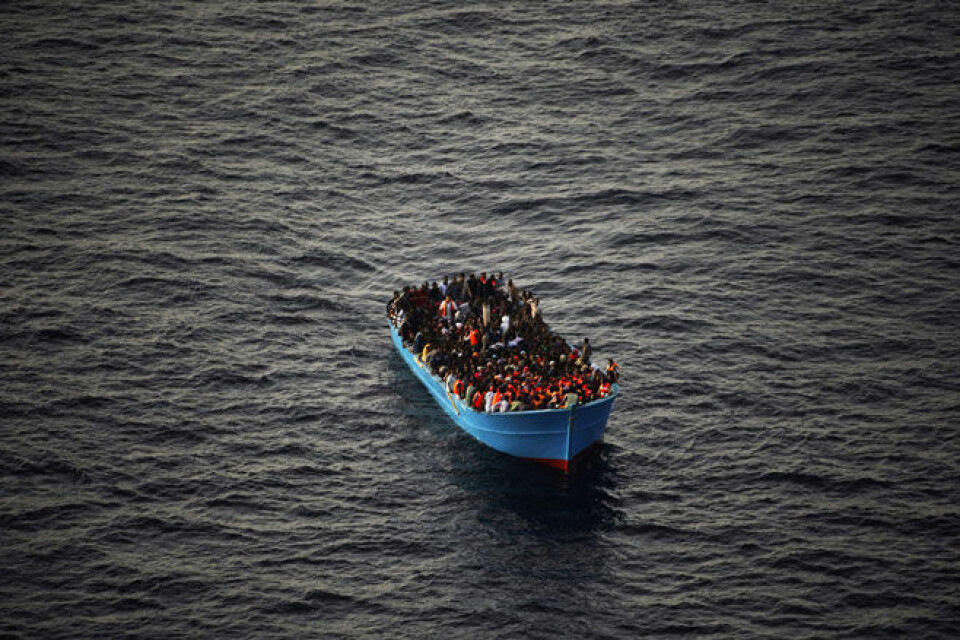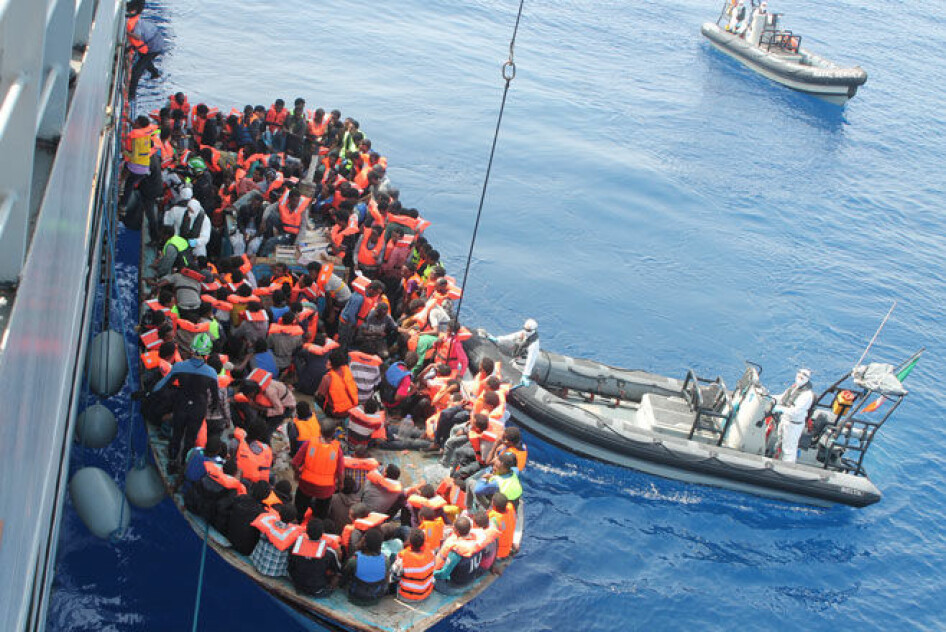
Beyond a state-centric right to protect human rights: Operation Mediterranea by land and sea
Who will protect the human rights of migrants at sea when the state fails to do so? GLOBUS researcher Michela Ceccorulli (University of Bologna) discusses the role of the non-governmental project Mediterranea Saving Humans in light of the recent criminalisation of humanitarian efforts in Italy.
Criminalisation of humanitarian efforts
Do sovereignty concerns have reason to overstep the protection of basic human rights? The issue is far from new and it is currently being urgently revived. The novelty, perhaps, resides in the trade-off dimension the issue has been recently framed into, as if the fulfillment of sovereign prerogatives and adherence to human rights principles walk in parallel. An example of this reasoning is the ongoing Italian governance of migration, where ports have been closed to NGOs rescuing migrants and where NGO ships conducting Search and Rescue Operations have been seized. Criminalisation of this type of humanitarian efforts has become a recurrent phenomenon. ‘The days of indiscriminate access to Italy are over’, resonates the Italian yellow-green Minister for the Interior Matteo Salvini.
This is unfortunate, given the international community’s recent attempts to create a common approach to migration through the United Nations’ Global Compact on Migration adopted in December 2018. However, Italy has not signed the Compact. The Global Compact critically points to the issue of criminalisation of humanitarian efforts, and states that ‘the assistance of an exclusively humanitarian nature for migrants is not considered unlawful’. If humanitarian efforts are criminalised and the state takes no responsibility, then who ensures that basic human rights at sea are protected?
Operation Mediterranea Saving Humans
Waiving an Italian flag, and hence having access to Italian ports, Mediterranea seeks to remind Italy of its responsibilities to human rights concerns. The operation is a joint project by activists, NGOs, organisations and individual donors and its objective is to carry out monitoring and search and rescue activities in the central Mediterranean. Mediterranea has been defined as a NGO, but it is much more. Reducing it to a Search and Rescue Operation in the Mediterranean would obscure its inherent political message and its long-term vision.
Professor Sandro Mezzadra is one of the minds behind the operation. He says that it has been far from easy to carry out the idea of the project.
“Unsure how to react to the harsh turn and tones on migration of the newly established yellow-green Government in Italy, travelling to various ports to find a boat, talking to experts in the sector and, indeed, finding financial support – all this had to be done hidden from the media, which would have opened up for taking positions, bringing us back to the old confrontation games”, he elaborates.
One thing was never disputed: Inaction would be too heavy of a burden after the Diciotti case. In the Summer of 2018, the Italian Coast Guard vessel Diciotti, which was carrying 177 migrants after a rescue operation, was blocked from docking in the port of Catania by the Italian government and as a result was stranded at sea for days. The government has faced fierce criticism for the case, and Minister Salvini has been threatened with trial for illegally confining migrants.

Irish Naval personnel rescuing migrants as part of Operation Triton. (Photo: Irish Defence Forces, CC BY 2.0)
A crisis of the humanitarian?
Entering its fifth mission, Mediterranea has already met its first objective: to testify to what is going on in the Mediterranean, says Mezzadra:
“Migrants are still leaving, the Libyan coast guard is the new gendarme of a sea mostly devoid of life vests. During the last two years’ criminalisation of NGOs and their main function – rescuing migrants at sea – we are witnessing a true crisis of the humanitarian.”
Mezzadra emphasises that this has not always been the case for NGOs in Italy:
“For many years, NGOs have represented a normal presence in frontline areas. During the unilateral humanitarian military operation Mare Nostrum, deployed in the Mediterranean Sea by Italy during 2013, NGOs acted as a key government(al) device, working in full coordination with the Italian navy.”
Victimisation of migrants
Fully aware of NGOs key role at sea and highly respectful of their commitment, Mezzadra has albeit been critical of the humanitarianism's specific view of migrants, which inadvertently produces voiceless and agency-less victims. Using the words of Didier Fassin in his book Humanitarian Reason, ‘the humanitarian reason has been governmental and has favoured paternalistic attitudes’, which, according to Mezzadra, ‘are the opposite of the conception of citizenship and closer to the conception of wardship of Kantian memory’.
On the contrary, explains Mezzadra, ‘there is an urgent need to listen to and accept migrants’ subjectivity’. However, the role of NGOs is not lost; some of them, as for instance Proactiva Open Arms, are collaborating with Mediterranea.
“We have similar aims, but my view of migrants is focused on them been perceived as subjects with own aims and aspirations, while their work remains strongly projected towards search and rescue efforts at sea”, says Mezzadra.
”What is even more important is that NGOs provided us with skills and knowledge, forged within many years of experience, that have been and remain crucial for our operation”, he adds.
Not only states have the right to intervene
Project Mediterranea has hence been conceived in the crisis of the humanitarian: it is a Non-Governmental Action (NGA) that strongly opposes to the principle that only authorities in charge should inhabit crisis areas. Mezzadra recalls Michael Foucault’s speech in 1981 before the United Nations in Geneva, ‘Confronting Governments: Human Rights’:
“There is a right to intervene wherever pain and sufferance exist, even when this runs contrary to the sovereign right of the state. This is what we aim at and we try to promote through the creation of platforms of actions where NGOs play a role but are by no means the only actors”, says Mezzadra.
Creating a bridge between land and sea is the polar star of these platforms. And in fact, during periods when operation Mediterranea’s ship, Mare Jonio, is stuck in dry docks waiting for more favourable weather conditions (and further funds) to sail, a route overland (Via di terra) is ready to take the operation’s purpose forward.
The operation has both sea and land aspects, and invites particular reflection of the gigantic effort that has to be made ‘against the political depression of our generation’, says Mezzadra. This reflection must inevitably accompany, if not precede, operative actions at sea. The boat may stand still and operations at sea may come to an end, but the political message has to stay afloat. Mezzadra underlines that ‘Mediterranea has never been thought of as a symbolic operation’.
Reactivating justice
The route that transits overland is communicated through events, public initiatives, speeches, debates, conferences, and a crowdfunding campaign all across Italy. Mezzadra defines the operation activity at sea and land ‘a donquixotesque endeavour: figuring out an alternative way, a lateral and unexpected one to show resistance to the Government’. It is not about tilting at windmills, but about countering a purposeful deviation from what we deem not worthy of pity but rather just. If so, how does the operation stand with respect to a broader conception of global justice? Mediterranea wants ‘to open up new spaces of justice thanks to the deep political significance that the reactivation of the Law of the Sea produces’, says Mezzadra.
In the Mediterranean, there is a disconnect between the sense of justice and the way in which it is administered.
“There is quite the tension between justice and (historical, institutional) regimes of justice. In the Mediterranean, there is a disconnect between the sense of justice and the way in which it is administered. After the criminalisation of NGOs, there is a strong need to reactivate justice so that a space can be created for new justice regimes”, he argues.
But now that Mediterranea is almost the sole actor in what has been named ‘the most dangerous sea corridor of the world’, it has come under political fire. A recently issued Directive by the Ministry for the Interior points the finger at the work of the operation. In March, the rescuing of 49 migrants by the ship Mare Jonio in international waters has triggered a major quarrel with Minister Salvini, who has accused the crew of having bypassed Rome’s instruction on disembarkation.
Mediterranea’s purpose is majestic and making it through the toxic rhetoric looming large in the public debate is a truly gigantic windmill.
This blog was written as part of the research project GLOBUS Reconsidering European Contributions to Global Justice (funded by the EU’s Horizon 2020 programme) and first published at the Global Justice Blog www.globus.uio.no.







